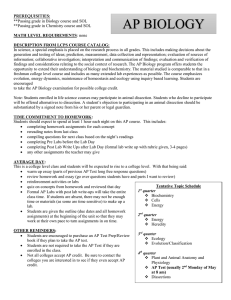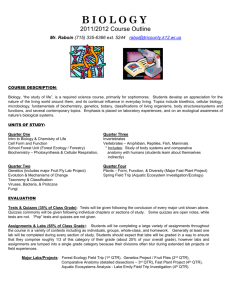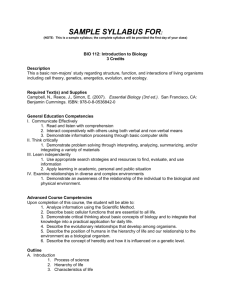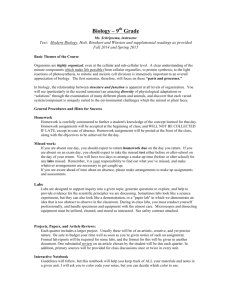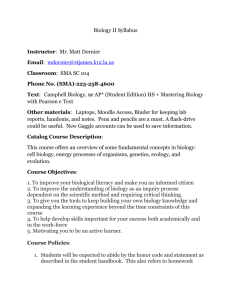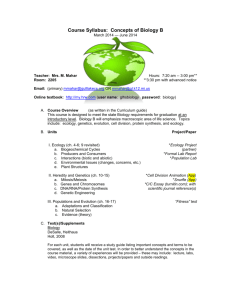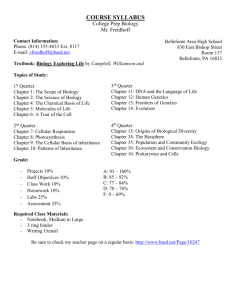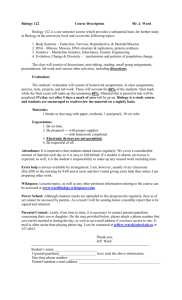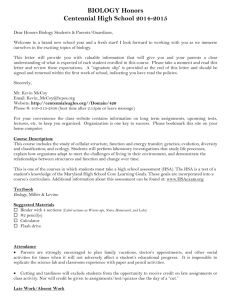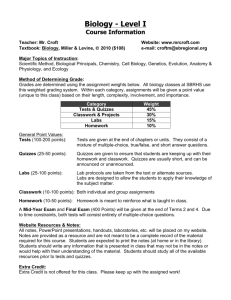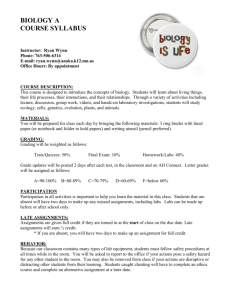AP Biology Syllabus Syllabus 2015-2016
advertisement
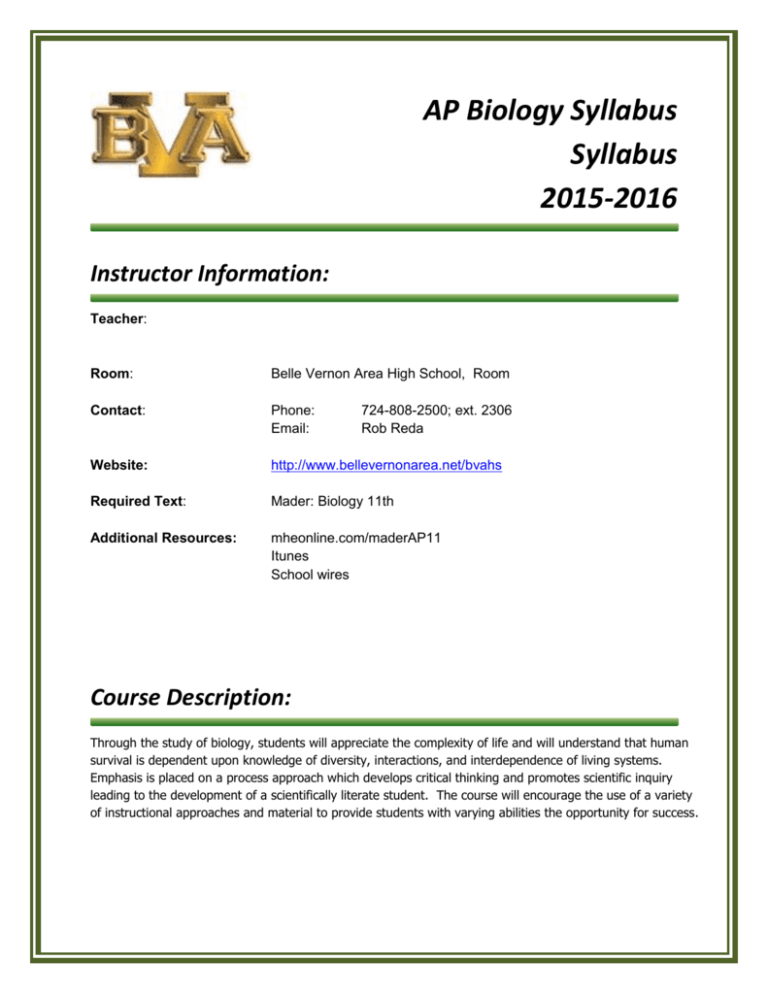
AP Biology Syllabus Syllabus 2015-2016 Instructor Information: Teacher: Room: Belle Vernon Area High School, Room Contact: Phone: Email: Website: http://www.bellevernonarea.net/bvahs Required Text: Mader: Biology 11th Additional Resources: mheonline.com/maderAP11 Itunes School wires 724-808-2500; ext. 2306 Rob Reda Course Description: Through the study of biology, students will appreciate the complexity of life and will understand that human survival is dependent upon knowledge of diversity, interactions, and interdependence of living systems. Emphasis is placed on a process approach which develops critical thinking and promotes scientific inquiry leading to the development of a scientifically literate student. The course will encourage the use of a variety of instructional approaches and material to provide students with varying abilities the opportunity for success. Course Objectives: By the end of this course, the successful student will be able to: 1. Demonstrate skills in using various types of biological instruments and scientific methods. 2. Apply biological knowledge and critical thinking to environmental and social concerns. 3. Apply biological knowledge to the eight major themes (Science as a process, Evolution, Energy transfer, Continuity and change, Relationship of structure and function, Regulation, Interdependence, and Science, technology and nature). 4. Learn how to read and critique papers written by scientists in the field of biology. 5. To pass the AP exam with a 3 or better. Academic Honesty: Any work submitted by the student shall be his/her own. Work taken from others shall be deemed as unacceptable. Any doubts will initiate the completion of an alternative assignment or a zero on the required effort, depending on the severity of the infraction. Class Policies and Expectations: 1. Since preparation enhances performance, it is expected that students will keep a notebook to organize notes & materials. The notebook will be valuable when studying for tests. 2. Because so much material is covered in such a short period of time, frequent absences will cause you to fall behind. 20 in a year will result in credit denial. IT IS YOUR RESPONSIBILITY AS A STUDENT TO MAKE UP MISSED WORK WHEN YOU RETURN TO CLASS. 3. Tests notices are given at least one week’s in advance. Tests will be taken on the assigned test date. Failure to do so will result in a zero. 4. Assignments will be collected on the due date at the beginning of class. Failure to do so will result in a zero for that assignment. 5. Assignments (INCLUDING TESTS) given before the student’s absence are due on the day the student returns to class. Failure to do so will result in a zero 6. If you are absent on the day homework was assigned YOU ARE RESPONSIBLE FOR GETTING THE ASSIGNMENT FROM THE MAKE-UP FOLDER at the beginning or end of class the next day you are present. You will have the same amount of time as the other students to complete the assignment (Usually the time period is one night). 7. If you are absent on the day of a quiz or test YOU ARE RESPONSIBLE FOR MAKING ARRANGEMENTS WITH ME AT THE BEGINNING OR END OF CLASS to take the test. You will have 5 school days to make up a quiz, and 10 school days to make up a test. Try to be prepared to make them up the day you return. There will be a list posted as to who has to make up a test or quiz & the date they need to make them up by. 8. Failure to make up assignments, tests, and quizzes by the deadline will result in a zero. 9. CHEATING IS NOT TOLERATED! The first offense will result in a zero for that assignment or test. The second offense will result in a zero for that assignment and the student will be sent to administration. Cell Phone’s, turn them off. I will ask you to put them away the first time I see it. Afterwards I will take your cell phone off of you and give it to the office. 10. Disabilities: If you have a disability that requires special accommodations, you need to notify the teacher no later than the 2nd week of class. Course Grading Criteria: All quizzes, tests, and projects will be graded according to the Belle Vernon Area School District grading policy. Total points will be accumulated for all evaluated efforts in this class rather than having letter grades per each effort. The grading scale is as follows: A B C D F - 90-100 80-89 70-79 60-69 0-59 Assignments per Quarter: Tests Each chapter quiz will be composed of true and false, matching, multiple choice, and essays. There will unit test consisting of three chapters each as well as a nine week exams that covers all the material during each quarter. Labs All formative labs are student directed laboratory investigations used throughout the course allow students to apply the scientific practices define in the AP Biology Curriculum Framework and include at least two lab experiences in each of the four big ideas. Several labs will be conducted for the majority of the units that will require a lab write up. The lab report must be type and include the following (Objectives, hypothesis, materials, procedure, data table and graphs, source of error, conclusion, and questions from lab answered. These lab experience provide student opportunities with each of the four Big ideas listed below in the AP Curriculum Map. Labs are three forty two minute (126 minutes)periods out of 9 periods (378 minutes) out of a six day cycle. AP Lab 1 – Artificial Selection Genetics of Organisms AP Lab 2 – Hardy-Weinberg AP Lab 3 – DNA Sequencing to Understand Evolution AP Lab 4 – Diffusion and Osmosis AP Lab 5 – Plant Pigments & Photosynthesis AP Lab 6 – Cellular Respiration AP Lab 7 – Cell Division: Mitosis and Meiosis AP AP AP AP AP AP Lab Lab Lab Lab Lab Lab 8 – Bacterial Transformation 9 – Restriction Enzymes 10 – Energy Dynamics 11 – Transpiration 12 – Fruit Fly Behavior 13 - Enzymes Other labs: Dissolved Oxygen and Aquatic Primary Productivity. Physiology of the Circulation System , Population Genetics and Evolution, Insects collection, Leaf collection, Caloric lab, Kinetic and potential energy lab, Plant diversity lab, Animal diversity Lab, Web of Life lab, US Demographics Lab Pre & Post 1950. Reading Guides: Weekly reading will be assigned, please check school wires for which on and the due dates of each. Study Island: Weekly Study Island will be assigned which covers the current topics of the week. Please log onto the study island web site to determine which ones are due. Academic Standards: Students will be reacquainted with the Pennsylvania Academic Standards that have been adopted by the Department of Education, along with the Common Core Standards that are in the process of being implemented nationwide. Students will be made aware of the importance of the standards and the efforts to meet them. eSchools: If Grades are automatically updated through eSchools. Schoolwires (Website): My website will be updated every Friday. Course Topics, Assignments, and Quizzes and Tests are also posted weekly. The following signatures state that all parties are aware of the preceding syllabus. Student Signature____________________Date_______________ Parent Signature_____________________Date_______________ Teacher Signature____________________Date_______________ Course Outline: 1st Quarter I. View of Life The Scientific Method Laws, Theories and Principles 2nd Quarter I. Evolution Darwin and Evolution Population Evolution Speciation and Macroevolution Origin of Life Taxonomy 3rd Quarter I. Plant Evolution Plant Diversity Flowering plants: Structure & organization Nutrition and transport Control of growth Reproduction 4th Quarter I. Comparative Anatomy II. The Cell Basic Chemistry Biochemistry Cell Strycture and Function Cell Membrane and function Metabloism: energy and enzymes Photosynthesis Cellular Respiration III. Genetics Basis of Life Cell Cycle Meiosis Mendelian Genetics Molecular Biology Gene Regulation and Expression Biotechnology II. Microbiology and Evolution Viruses, Bacteria, and Archaebacteria Protista diversity Fungi Evolution II. Animal Evolution Invertebrate evolution Vertebrate Evolution Human Evolution Organization and Homeostasis Circulation Lymphatic and Immunity Digestive System Respiratory System Body Fluid Regulation Nervous System Locomotion and Support Hormones Development and Aging II. Behavior & Ecology Behavior Ecology Population Ecology Community and Ecosystems Biosphere Conservation of biodiversity III. Review of AP Exam
